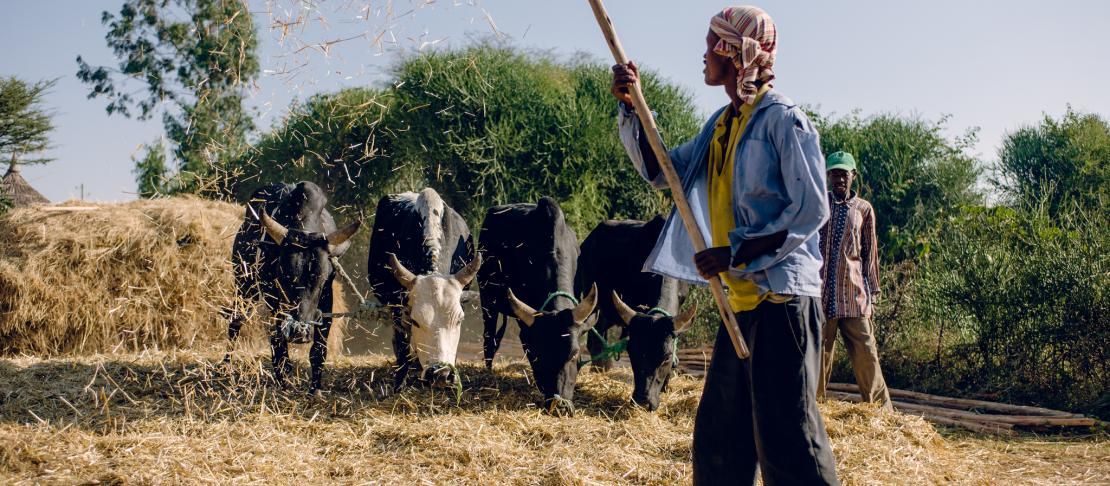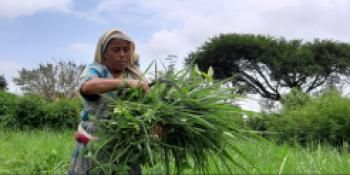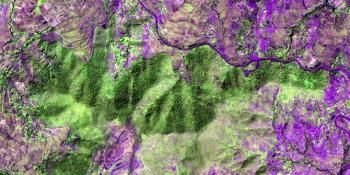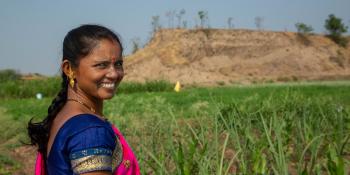Using science to inform low emissions livestock policy development and implementation in East Africa

“There is a great opportunity to demonstrate mitigation progress as a co-benefit of agricultural development or resilience and adaptation building measures”.
H.E. Professor Fekadu, State Minister of Livestock Resources, Ethiopia
This was Professor Fekadu's opening statement for the Low Emissions Livestock: Supporting Policy Making and Implementation through Science in East Africa regional awareness raising workshop held at the UN Economic Commission for Africa (UNECA) in Addis Ababa, Ethiopia in 2–4 July 2018.
The workshop was organized by the Global Research Alliance on Agricultural Greenhouse Gases (GRA), the CGIAR Research Program on Climate Change, Agriculture and Food Security (CCAFS), Food and Agriculture Organization of the United Nations (FAO) and the World Bank. These four organizations worked closely to bring together about 85 participants from across East Africa and the world. The workshop created a platform for senior government, policy and science representatives working in the livestock sector to:
- discuss countries’ ambitions for livestock development and climate change, and understand the challenges;
- showcase relevant ongoing work of the four organizations that is focused on: (i) Improving the efficiency of livestock production; (ii) reducing greenhouse gas emissions and enhancing resilience; and (iii) strengthening national measurement, reporting and verification (MRV) for low emissions livestock systems;
- understand how science underpins this work, including helping to support countries’ Nationally Determined Contributions (NDCs);
- identify ways that the GRA, CCAFS, FAO and the World Bank can help build regional and national capacity and contribute to project implementation through tailored initiatives in the future.
What's the role of science in developing low emitting livestock systems? Keynote by @nzagrc @FAO at low emissions #livestock workshop. @GRA_GHG @WorldBank @CGIARClimate @AfricanClimate @ILRI pic.twitter.com/0yzGAXyr6u
— Catherine Mungai (@catmungai) July 3, 2018
Understanding the challenges
The workshop started with scene-setting presentations by Sarah Ossiya of the African Union Inter-African Bureau for Animal Resources on the role of livestock in sustainable development in East Africa, and by James Murombedzi of the African Climate Policy Centre (ACPC) on the pathways to low emissions livestock farming in East Africa. Getachew Tegegn and Robin Mbae made presentations on the country objectives and trends of livestock production, production systems and climate change mitigation, National Determined Contributions (NDCs) and role of agriculture and livestock in Ethiopia and Kenya. These presentations led to an in-depth discussion about the future of pastoralism in East Africa, inequality and poverty reduction in the context of the livestock sector, the need for integrated efforts, and the need to move from Tier 1 to Tier 2 reporting of greenhouse gas emissions for all countries.
Reducing greenhouse gas emissions is a huge task and because of that, it can seem overwhelming to individuals, policy-makers and governments. Breaking the problem down and tackling its component parts is ever more critical.”
H.E. Mark Ramsden, Ambassador of New Zealand to Ethiopia and the African Union
This discussion on ambitions and challenges regarding low emissions livestock saw participants address key questions in relation to the livestock and environment objectives of their respective countries in a facilitated group session. The outcome of this session was a convergence of three overarching challenges and priorities across the region:
- MRV for low emissions livestock systems
- Identifying options to reduce emissions in the context of the broader development and food security agenda
- Awareness raising of low emissions and climate-smart livestock systems
Identifying opportunities
The participants learned about the ongoing regional activities and initiatives on low emissions development in the livestock sector from the World Bank, CCAFS, FAO, and GRA. This allowed participants to identify opportunities for research and policy agendas at the national and regional levels.
The participants highlighted the opportunity for developing a central and consolidated database for data generation, collection, and coordination. Moreover, participants shared details of their platforms that could be used as stepping stones and opportunities to spread awareness of low livestock emissions and the science of greenhouse gases at the global, continental, regional and national levels.
View the photos from the workshop:
Moving forward together
An increasing understanding of low emissions livestock, key challenges, priorities and opportunities at the regional and national levels allowed all stakeholders to reflect on ways to strengthen their strategies and work together in multistakeholder initiatives. This approach allows for greater engagement at the policy and implementation level using science.
To show their support for the low emissions livestock agenda, participants made a commitment to move forward together and specifically to share their learnings from the workshop with their colleagues and incorporate the learnings into their strategy. Beyond this, some committed to continue networking with regional actors and work together on the challenges and opportunities identified, for example around awareness raising.
The workshop ended with a common sentiment of continuing the work that was kicked off during the workshop by collaborating on concrete and sustainable actions. This was also highlighted in the closing remarks of H.E. Gemedo Dalle, Minister for Environment, Forestry and Climate Change (MoEFCC), Ethiopia, who said:
“We need to strengthen regional and national coordination and exchange of data and information to achieve sustainable solutions.”
Download the workshop presentations:
- The role of livestock in sustainable development in East Africa
- Pathways to low emissions livestock farming in East Africa
- Presentation: The Low Emissions Livestock Workshop | Ethiopia Ministry of Agriculture and Livestock
- Ambitions and challenges regarding low emissions livestock sector in Kenya
- Livestock MRV at national level
- What Science tells us: What are the emissions & how can they be reduced?
- Opportunities for LED in agriculture in East Africa: a regional perspective
The three-day workshop at UNECA was organized by Hayden Montgomery, Harry Clark, Laura Kearny and Sinead Leahy (GRA); Carolyn Opio (FAO); Pierre Gerber (WB); James Murombedzi and Yosef Amha (ACPC); and Catherine Mungai, Maren Redeny and Dawit Solomon (CCAFS EA).
The workshop participants included national, regional and international experts from the livestock sector, and other dignitaries including: H.E. Professor Fekadu Beyene, State Minister of Livestock and Fisheries Development Sector - Ministry of Agriculture and Livestock Resources (MoALR), Ethiopia; H.E. Dr. Gebregziabher Gebreyohannes, State Minister of Livestock Health and Feed Regulatory Sector - MoALR, Ethiopia; H.E. Gemedo Dalle, Minister of MoEFCC, Ethiopia; and H.E. Mark Ramsden Ambassador of New Zealand to Ethiopia and the African Union.
Ravina Pattni is a Graduate Fellow at CCAFS East Africa and a Graduate Student at Columbia University working with the International Research Institute for Climate and Society (IRI) on a five-year project called Adapting Agriculture to Climate Today, for Tomorrow (ACToday), for which CCAFS and the CGIAR are key partners.



